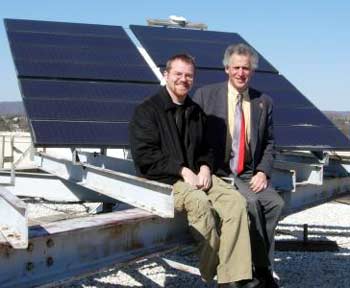Sovacool, who just defended his doctoral dissertation on April 17 on "The
Power Production Paradox: Reflecting on the Socio-technical Impediments to
Distributed Generation Technologies," will graduate in May.
"The title is fancy, but the project is relatively simple," Sovacool said.
"Distributed generation, or DG technologies, refers to small,
decentralized power generators that make electricity close to the point of
consumption. They include renewable energy resources like wind turbines
and photovoltaic (solar) panels, but also small non-renewable resources
like fuel cells, micro-turbines, and reciprocating engines."
Sovacool's dissertation questions: "If DG/renewable energy systems have
been around since the 1970s and have such potential benefits as less
environmental impact, widely available fuel, and better thermal
efficiency, then why aren't they used more?"
In response, Sovacool says, "It turns out that a host of social and
technical factors, rather than only technical issues, prevent the use of
DG/renewable technologies. These socio-technical impediments include
things like utility preferences, business practices, and consumer
attitudes."
For example, Sovacool said that he learned that business practices have
not been established to push most companies to either invest in or use
more renewable technologies. "In addition, consumers continue to view
electric power systems as mundane and unimportant -- unless they are to be
opposed for aesthetic or environmental reasons."
Sovacool received a rare $12,000 Doctoral Dissertation Improvement Grant
from the National Science Foundation (NSF) to do his research, which
enabled him to conduct 62 interviews at electric utilities, regulatory
agencies, interest groups, energy systems manufacturers, nonprofit
organizations, energy consulting firms, universities, national
laboratories, and state institutions. He interviewed the Assistant
Secretary of Energy, three executive vice presidents of large utility
companies, two directors of national laboratories, "and a host of other
influential energy experts." Sovacool traveled to Burlington, Vermont,
Albany, New York, Washington, DC, Los Angeles, San Francisco, and Chicago.
"Understanding the impediments to DG/renewable energy systems is essential
if our country is to transition to a more sustainable energy future,"
Sovacool said. "If the obstacles are socio-technical rather than only
technical, the government needs to do more than just aim subsidies and tax
credits at singularly technical issues, such as capacity factors and
capital costs. The United States is set to phase out a number of its
hydroelectric and nuclear generators in the next two to three decades.
This means that policymakers will have to rely on other sources of power -
such as DG/renewables -- to provide power to customers."
Sovacool said his research is important to anyone concerned about the
environment, rising electricity costs, or keeping the power on - which is
why he also received support from the Virginia Center for Coal and Energy
Research at Virginia Tech and was an Oak Ridge Center for Advanced Studies
2005 Summer Graduate Fellow.
